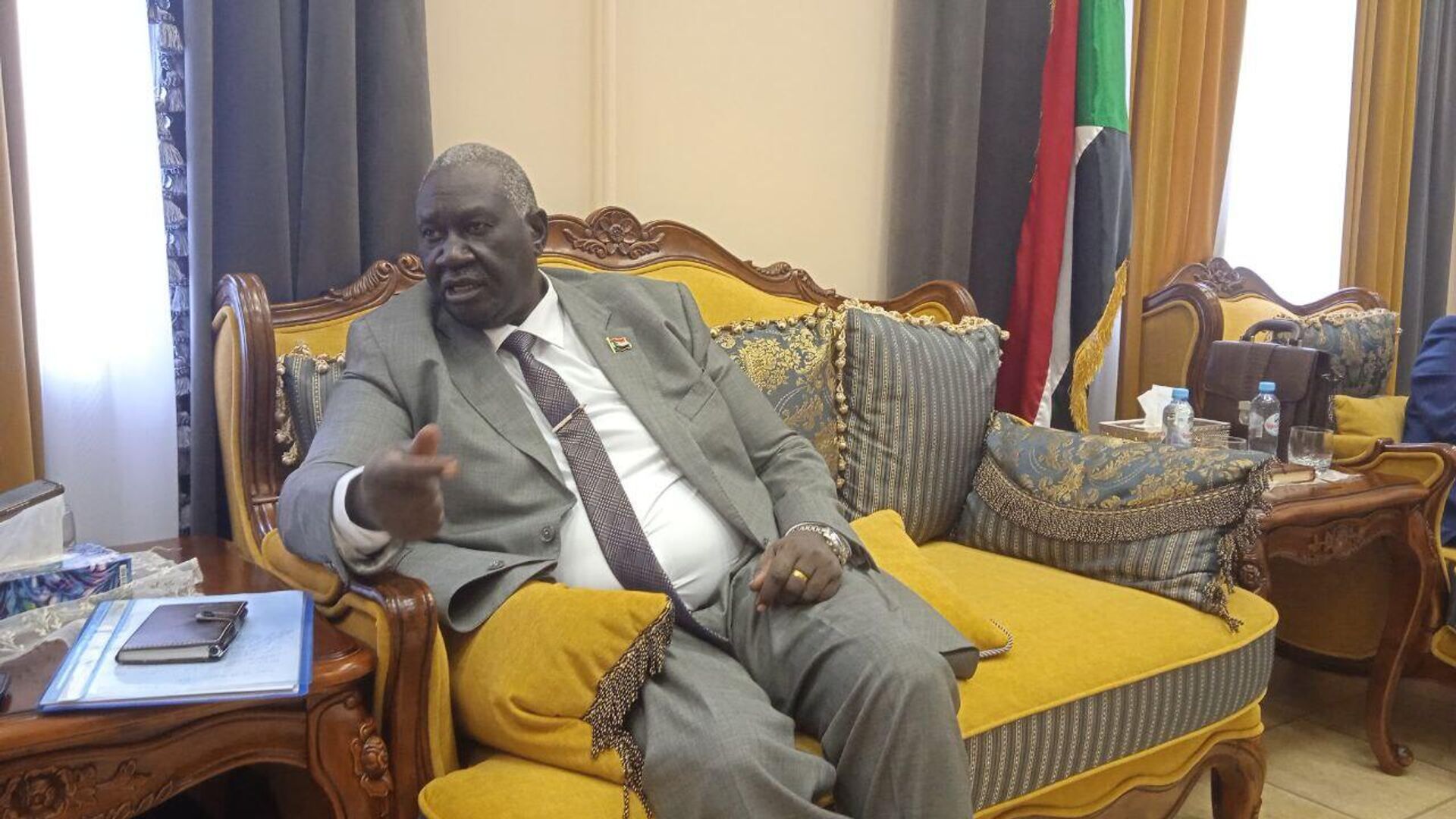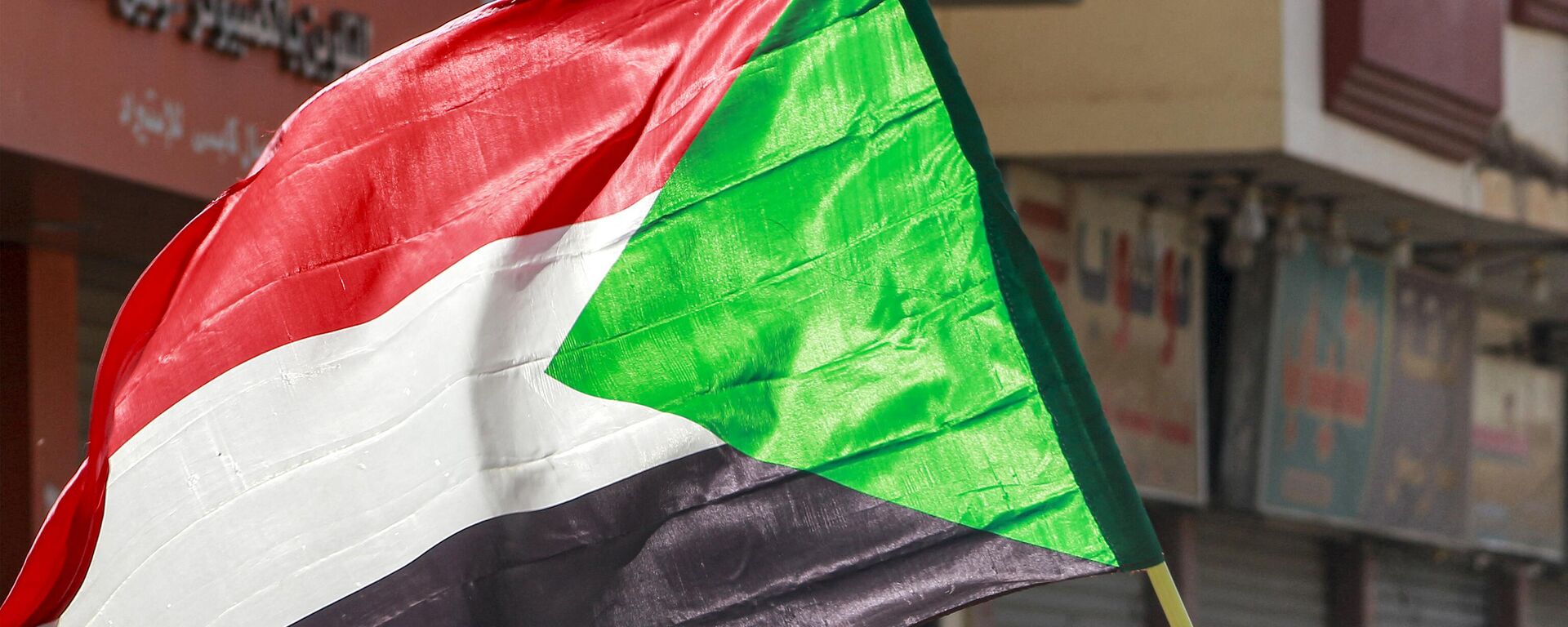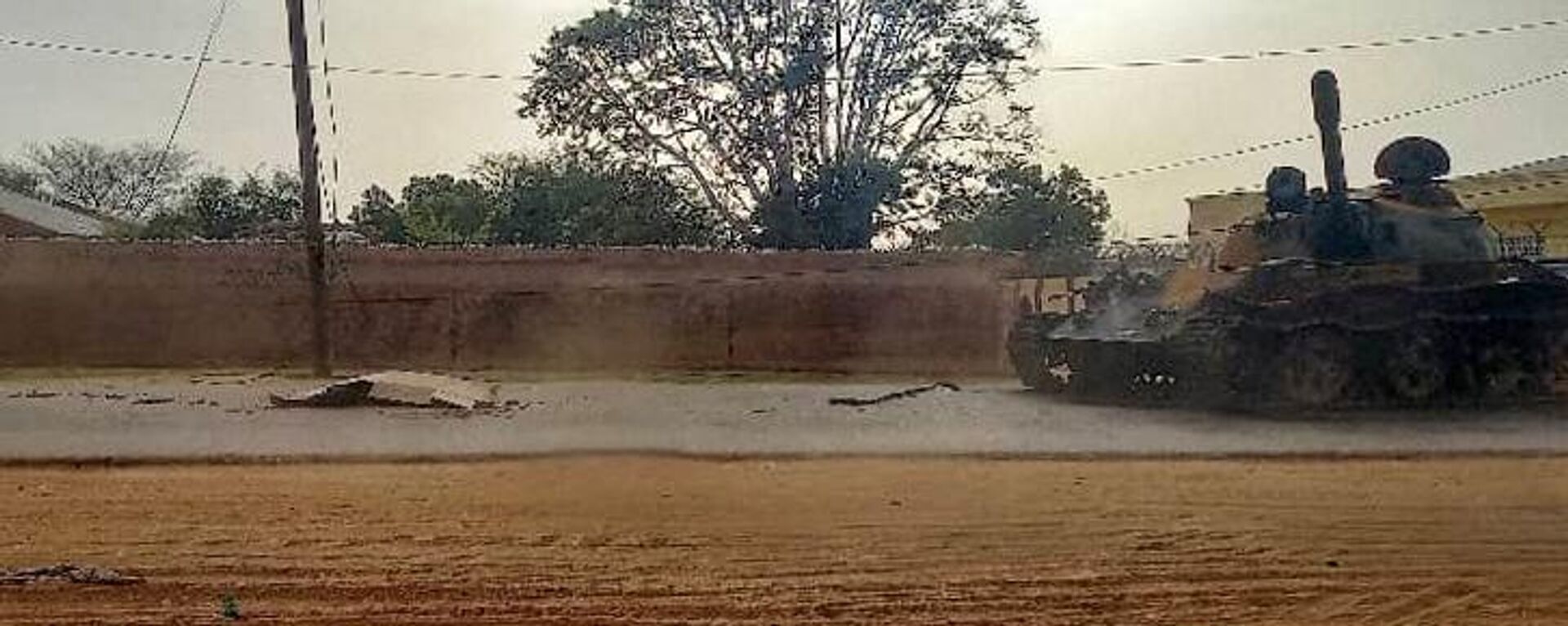https://en.sputniknews.africa/20230702/conflict-resolution-business-of-sudan-but-russia-may-contribute-top-sudanese-official-1060272284.html
Conflict Resolution 'Business of Sudan,' But Russia May Contribute: Top Sudanese Official
Conflict Resolution 'Business of Sudan,' But Russia May Contribute: Top Sudanese Official
Sputnik Africa
Earlier this week, Russian Foreign Minister Sergey Lavrov met with Malik Agar, the deputy chairman of Sudan's Transitional Sovereign Council. During the... 02.07.2023, Sputnik Africa
2023-07-02T12:37+0200
2023-07-02T12:37+0200
2023-07-02T13:45+0200
north africa
sudan
sudan armed forces
south sudan
conflict
clashes
intergovernmental authority on development (igad)
opinion
https://cdn1.img.sputniknews.africa/img/07e7/07/01/1060272422_0:0:1281:720_1920x0_80_0_0_54acf0c5466e516ac2f1d67fb481adbb.jpg
The ongoing conflict is first and foremost an internal issue of Sudan, but other nations, including neighboring countries, may contribute to its peaceful resolution by supporting initiatives on conflict settlement, said Malik Agar, the deputy chairman of Sudan's Transitional Sovereign Council, in an interview with Sputnik Africa.However, the official further elaborated by saying that other countries, "big" ones like Russia, "have a weight that they can put in," and play a certain role in the resolution of the conflict. According to the deputy chairman, Sudan itself, the region, and neighboring states are trying to come up with viable solutions to the situation, but support from other nations would also be helpful.Agar underlined that other nations willing to assist in the conflict settlement in Sudan don't have to directly participate in the peace initiatives and negotiations, referring to those led by the Intergovernmental Authority on Development (IGAD), or the Saudi-American initiative in Jeddah. At the same time, he noted, these countries could contribute "to any initiatives that will solve the problem in Sudan" by expressing their stance and providing advice to the Sudanese people.He also pointed out that all neighboring countries have an equal opportunity to contribute in some way to resolving the ongoing conflict in Sudan, including South Sudan, Egypt, Ethiopia, and Chad, which are the most affected by the situation in the North African country.However, the senior official stressed that any peace initiative on the Sudanese conflict must be in line with the country's "roadmap" for resolving the conflict.Commenting on this issue, he noted that the Sudanese government has changed the roadmap for the settlement of the conflict submitted by the Intergovernmental Authority on development (IGAD), to which it had some reservations, so that it is in line with the Sudanese road map.Agar explained that the Sudanese government's reservations about the regional initiative's roadmap "emanated from the leadership of the quartet of IGAD," which includes Kenya, Ethiopia, South Sudan, and Djibouti.On April 15, clashes erupted between the Sudanese regular armed forces and the paramilitary Rapid Support Forces (RSF), with the epicenter in Sudan's capital, Khartoum. Ever since, fighting has gripped the nation's capital and the western region of Darfur, despite a series of truces and efforts of the international community to effect peace.
https://en.sputniknews.africa/20230629/deputy-head-of-sudan-transitional-sovereignty-council-malik-agar-arrives-in-moscow-1060234647.html
https://en.sputniknews.africa/20230620/kenya-vows-neutrality-in-pursuing-peace-for-conflict-torn-sudan-1060049988.html
north africa
sudan
south sudan
Sputnik Africa
feedback@sputniknews.com
+74956456601
MIA „Rossiya Segodnya“
2023
News
en_EN
Sputnik Africa
feedback@sputniknews.com
+74956456601
MIA „Rossiya Segodnya“
Sputnik Africa
feedback@sputniknews.com
+74956456601
MIA „Rossiya Segodnya“
north africa, sudan, sudan armed forces, south sudan, conflict, clashes, intergovernmental authority on development (igad)
north africa, sudan, sudan armed forces, south sudan, conflict, clashes, intergovernmental authority on development (igad)
Conflict Resolution 'Business of Sudan,' But Russia May Contribute: Top Sudanese Official
12:37 02.07.2023 (Updated: 13:45 02.07.2023) Muhammad Nooh Osman
Writer/Editor
Exclusive
Earlier this week, Russian Foreign Minister Sergey Lavrov met with Malik Agar, the deputy chairman of Sudan's Transitional Sovereign Council. During the meeting, Lavrov stated that Russia is watching the situation in the country with concern and is ready to assist in resolving the conflict.
The ongoing conflict is first and foremost an internal issue of Sudan, but other nations, including neighboring countries, may contribute to its peaceful resolution by supporting initiatives on conflict settlement, said Malik Agar, the deputy chairman of Sudan's Transitional Sovereign Council, in an interview with Sputnik Africa.
"War is not a fete. War is a serious business," he stressed. "This is a business of the Sudanese. And the Sudanese are the ones killing and the ones shooting themselves. If the war has to stop, also the initiative has to come from the Sudanese."
However,
the official further elaborated by saying that other countries, "big" ones like Russia, "have a weight that they can put in," and play a certain role in the resolution of the conflict. According to the deputy chairman, Sudan itself, the region, and neighboring states are trying to come up with viable solutions to the situation, but support from other nations would also be helpful.
"In any quarrel or in any dispute, always, the first thing you do, you call on the neighbors. And if the neighbors are not helpful to the extent that you are expecting, then you call on the far neighbors to come in [...]. And we believe the big countries also have a weight that they can put in," he explained.
Agar underlined that other nations willing
to assist in the conflict settlement in Sudan don't have to directly participate in the peace initiatives and negotiations, referring to those led by the Intergovernmental Authority on Development (IGAD), or the Saudi-American initiative in Jeddah. At the same time, he noted, these countries could contribute "to any initiatives that will solve the problem in Sudan" by expressing their stance and providing advice to the Sudanese people.
"We are not asking anybody to dictate terms for us, but we are asking anybody to help us develop our way and our roadmap [to a resolution of the conflict]," he said.
He also pointed out that all neighboring countries have an equal opportunity to contribute in some way to resolving the ongoing conflict in Sudan, including South Sudan, Egypt, Ethiopia, and Chad, which are the most affected by the situation in the North African country.
However, the senior official stressed that any peace initiative on the Sudanese conflict must be in line with the country's "roadmap" for resolving the conflict.
"The neighboring countries all enjoy chances of resolving the problem in Sudan in accordance with the Sudanese roadmap, because Juba is one of the neighbors that has been affected by the war. You have Egypt, it was affected, you have Ethiopia, you have Chad. These are all countries, which are neighbors that are affected," Agar noted.
Commenting on this issue, he noted that the Sudanese government has changed the roadmap for the settlement of the conflict submitted by the Intergovernmental Authority on development (IGAD), to which it had some reservations, so that it is in line with the Sudanese road map.
Agar explained that the Sudanese government's reservations about the regional initiative's roadmap "emanated from the leadership of the quartet of IGAD," which includes Kenya, Ethiopia, South Sudan, and Djibouti.
"In the initiatives of IGAD our reservations emanated from the leadership of the quartet of IGAD now, but we didn't have reservations as such. We had the reservations on the roadmap of the IGAD and then that roadmap was altered by us and then we put in our roadmap," the deputy head of Sudan's Transitional Sovereign Council said. "We believe this is our problem and we have to contribute more than everybody else."
On April 15, clashes erupted between the Sudanese regular armed forces and the paramilitary Rapid Support Forces (RSF), with the epicenter in Sudan's capital, Khartoum. Ever since,
fighting has gripped the nation's capital and the western region of Darfur, despite a series of truces and efforts of the international community to effect peace.




